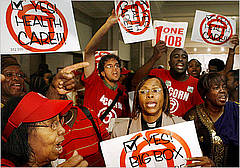This article from the New York Times talks about Chicago City Council's decision to pass the Big Box Ordinance. While the City Council passed it, Mayor Daley was silent on whether or not he would use his veto and the Illinois Retail Merchants Association is claiming the ordinance is unconstitutional, violating equal protection rights and causing illegal discrimination. Retailers have bombarded alderman with petitions, letters, and phone calls, as well as unions and community groups. Those supporting it use CostCo as an example of a large store who pays $10/hour and does not have to raise prices of goods. They also use San Francisco and Santa Fe as examples of states who passed Big Box ordinances and did not see a decrease in the amount of retailers coming to the city.

This political battle got a little dirty. Wal-Mart made some pretty blatant threats when the City Council acted, probably directed at Mayor Daley in an effort to provoke a veto of the bill. They said that Chicago would be essentially closed for business, and that they would reconsider opening any other stores there in the future.
This article offers a labor perspective on the decision to pass the Big Box Ordinance. It says that Spokane, Washington is attempting to put a similar measure on their 2007 ballot. Other Big Box laws have simply banned large-scale retailers or put non-wage regulations on them. This is bound to have political implications because the larger the business, the more corporate clout they possess, and this, more often than not, translates into political power. Wal-Mart is certainly reacting--the article states that they are suing the states that currently have big box laws, even ones that do not involve wage.
The article concludes with an interesting choice of words--the reporter says that the Senate voting down the "package" bill to reduce the estate tax served to keep alive the state campaigns, which will provide larger increases. This shows some preference for the state campaigns over a federal one, due to the higher wages and likelihood of success on the state level.
This article offers yet another take on Chicago's decision to pass the Big Box Ordinance.
The bill passed through the City Council 35-14, and it takes 34 votes to override a veto, so if Mayor Daley chose to use his veto, he would have to convince two aldermen to change their votes. According to the article, Mayor Daley has said that the insertion of big box stores into the city's poorest neighborhoods will spur development and job opportunities for the lower class. In my experience, Daley is a widely respected and liked figure in Chicago politics--he has done good things for the city in the past and I don't think he would have any difficulty showing people his side of things and persuading them to see things differently.
There is an interesting quote in here from Jerry Roper, president of the Chicagoland Chamber of Commerce. He said, "The aldermen who voted in support of this...helped put the sign up really big that development in Chicago is dead." An alderman who voted against the measure says that this would hurt the economy that they are trying to help.
Wal-Mart has said that they do not pay anyone less then $7.25/hour, a wage that is already far ahead of the federal minimum. I think that the $10 requirement, with additional benefits, is a little too idealistic. A spokesperson for Wal-Mart said that they would just focus on serving the city's residents from suburban locations, but this raises another policy issue--gas prices. People don't want to have to commute to their grocery store. They shouldn't have to--and all that does is add another expenditure to their dwindling monetary situation. This may seem far-fetched, but it could be possible that those in political power are purposefully choosing to ignore this side-effect, because they are heavily invested in the oil business.
